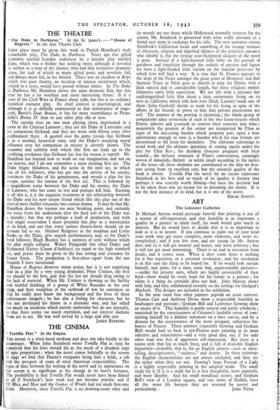"Tortilla Flat." At the Empire.
THE CINEMA
Tiffs screen is a strait-laced medium and does not take kindly to the picaresque. When John Steinbeck wrote Tortilla Flat in 1935 he contrived that his hero should die as the result of a drunken orgy of epic proportions ; when the novel comes belatedly to the screen in 1942 we find that Danny's escapades bring him a bride, a job and the prospect of years of strict American respectability. The lapse of time between the writing of the novel and its appearance on the screen is as significant as the change in its hero's fortunes. - The probability is that Tortilla Flat would never have been filmed at all if Steinbeck's later work had not become popular and if Of Mice and Men and the Grapes of Wrath had not made first-rate films. Moreover, since Tortilla Flat is no drawing-room stary and
its morals are not those which Hollywood normally reserves for the screen, Mr. Steinbeck is presented with what really amounts to a brand new story in exchange for his title. The new narrative retains Steinbeck's Californian locale and something of the strange mixture of chicanery, religion and dignified idleness of the penniless petisanos who inhabit it, but the strange near-Scriptural allegory of the novel is gone. Instead of a light-hearted little fable on the pursuit of goodness and simplicity through the ordeals of passion and liquor we have a light-headed little variant on the familiar processes by which love will find a way. It is true that St. Francis appears to the dogs of the Pirate amongst the great pines of Monterey and that Spencer Tracy as Pilon goes to church to pray for Danny with a latin naiveté and at considerable length, but these religious embel- lislunents carry little conviction. We are left with a pleasant but undistinguished little film about a latin community living on its wits in California which tells how love (Hedy Lamarr) made one of them (John Garfield) decide to work for his living in spite of the efforts of his friends to prove to him that private possessions are evil. The manner of the proving is charming ; the whole group of companions takes possession of each of the two frame-houses which Danny inherits and proceeds to convert their contents into wine ; meanwhile the protests of the owner are interpreted by Pion as signs of the increasing burden which property puts upon a man unfortunate enough to own it, a burden whizh his true friends are determined to lift from his shoulders. The elaborate schemings to avoid work and the ultimate ignominy of cutting squids under the pier for Chin Kee ; the drunken choruses pregnant with local scandal ; the delicate structure of Pilon's conversation, cunningly woven of innuendo, flattery or subtle insult according to the tactics of the hour—all these elements are contributed to the film by first- rate acting from an excellent cast, but the essential quality of the book is absent. Tortilla Flat the novel by no means represents Steinbeck at his best and so much of its quality is literary that perhaps it was scarcely worth filming—but once the decision had to be taken there was no excuse for so distorting the theme. It is not the first instance of its kind, but it is one of the worst.
EDGAR ANSTEY.


























 Previous page
Previous page